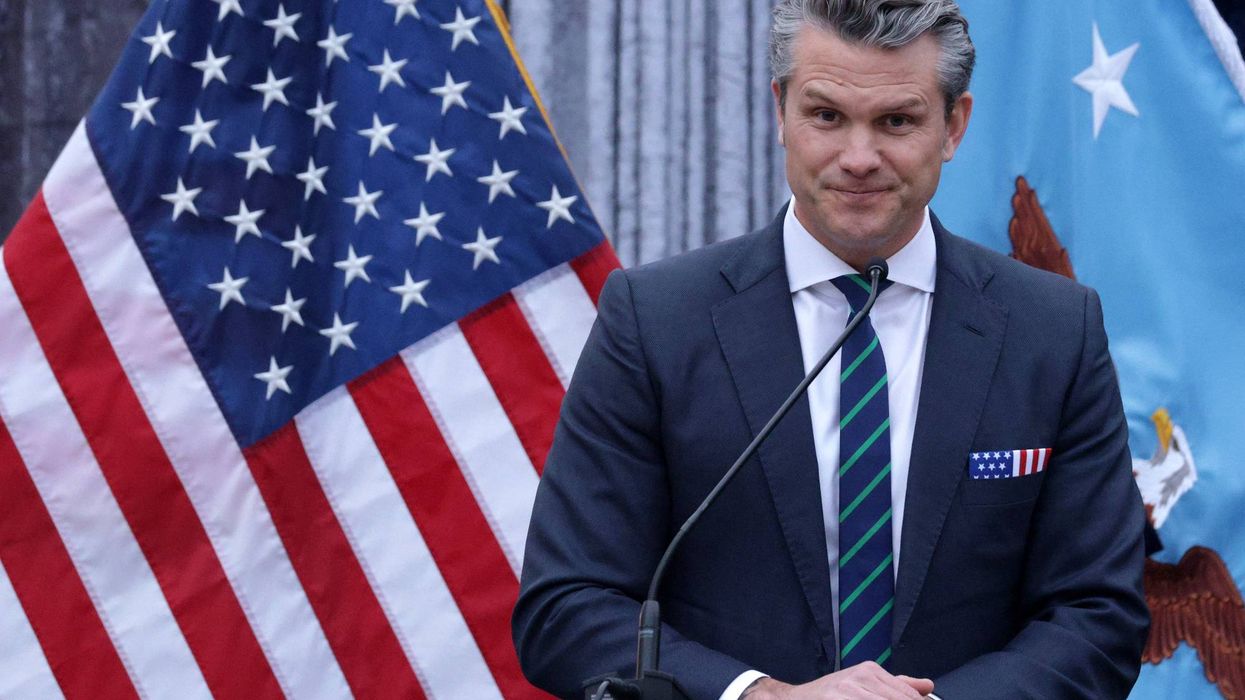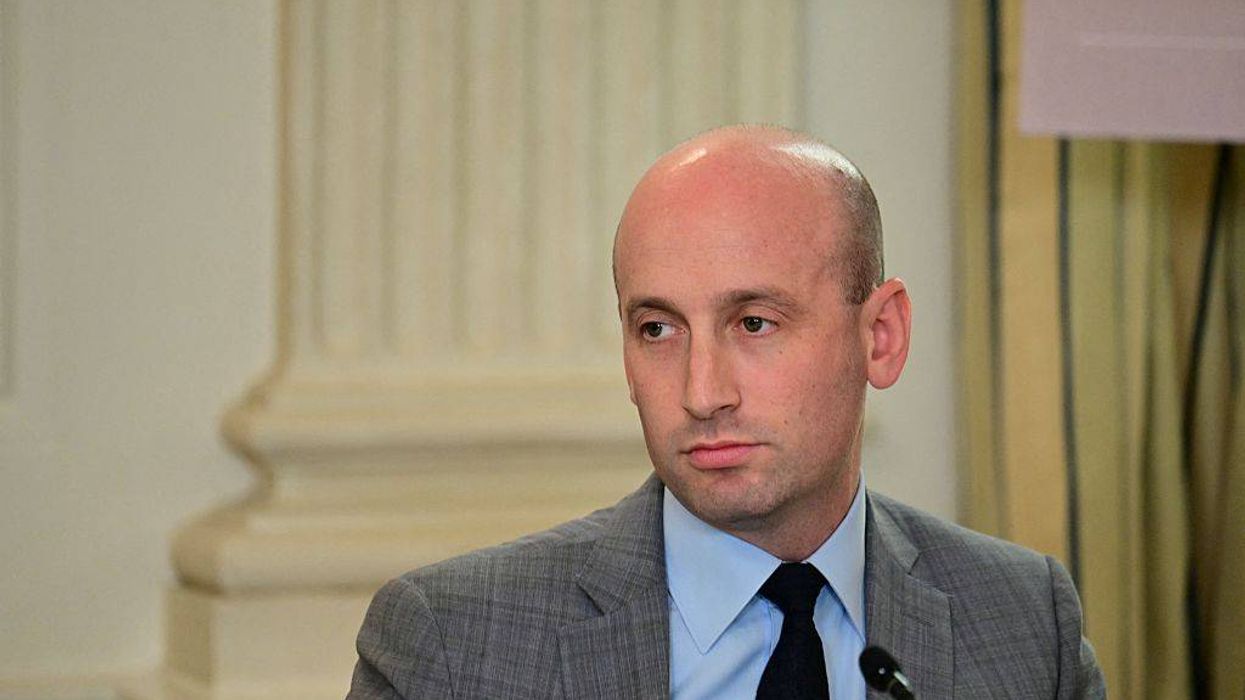May, 21 2021, 12:00am EDT

WASHINGTON
Today, Common Cause will file a complaint with the Federal Election Commission (FEC) alleging that Rep. Marjorie Taylor Greene (R-GA) violated the 'soft money' ban in the Federal Election Campaign Act (FECA) by soliciting unlimited contributions for a super PAC raising money for use in the Georgia Senate runoff elections. The allegations, first published by ProPublica, stem from a fundraising video that Rep. Greene recorded for the Stop Socialism NOW PAC, soliciting contributions to defeat candidates Rafael Warnock and Jon Ossoff in Georgia's January Senate runoffs.
Under federal campaign finance law, super PACs are allowed to raise and spend unlimited individual, corporate and labor union funds. But federal candidates and officeholders may not "solicit ... funds in connection with an election for Federal office ... unless the funds are subject to the limitations, prohibitions, and reporting requirements" of FECA. A federal candidate or officeholder must limit any solicitation for a super PAC to no more than $5,000 from an individual donor, and no corporate or union funds. Rep. Greene's solicitation was not limited as required.
"Candidate contribution and solicitation limits are a vital bulwark against deep-pocketed individuals and special interests attempting to buy influence and drown out the voices of the American people," said Karen Hobert Flynn, president of Common Cause. "The United States Supreme Court has been very clear in upholding candidate contribution limits and prohibitions on candidates soliciting funds outside those limits because such contributions lead to corruption and undermine the faith of Americans in the political process."
The complaint cites the High Court ruling in McConnell v. FEC upholding the 'soft money' ban and explaining that "restrictions on solicitations are justified as valid anticircumvention measures. Large soft-money donations at a candidate's or officeholder's behest give rise to all of the same corruption concerns posed by contributions made directly to the candidate or officeholder."
In the one-minute fundraising video, Rep. Greene's commentary runs for 47 seconds, criticizing Ossoff and Warnock and concluding: "Stop Socialism Now PAC will stop Ossoff and Warnock from stealing our Senate seats. It's time to fight back now, before it's too late." Her appearance is followed immediately by a voiceover urging viewers to "Make a contribution today to Stop Socialism Now PAC, because if Democrats win in Georgia, it's all over for America," while text on-screen urges viewers to "DONATE NOW" and directs them to the "donate" page for the PAC which is able to accept unlimited contributions.
"This videotaped solicitation for a super PAC clearly violates the soft money ban," said Paul S. Ryan, Common Cause Vice President for Policy and Litigation. "If candidates and officeholders can get away with this type of super PAC fundraising video, the soft-money ban will be virtually meaningless. The FEC needs to enforce the law and shut this type of fundraising activity down."
"Outside groups raised and spent staggering amounts of money in the Georgia runoff thanks to the massive political fundraising loophole created by the Supreme Court in its Citizens United ruling." said Aunna Dennis, executive director of Common Cause Georgia. "The line must be drawn when those groups raise those funds in violation of the laws on the books."
To read the FEC complaint, click here.
To view this release online, click here.
Common Cause is a nonpartisan, grassroots organization dedicated to upholding the core values of American democracy. We work to create open, honest, and accountable government that serves the public interest; promote equal rights, opportunity, and representation for all; and empower all people to make their voices heard in the political process.
(202) 833-1200LATEST NEWS
Critics Argue Striking Nigeria Won't 'Make Americans Safer' as US Warns of 'More to Come'
"Seems like the Armed Services committees ought to do some oversight regarding the expensive and pointless Christmas fireworks display in Nigeria," said one legal expert.
Dec 26, 2025
After the Trump administration bombed alleged Islamic State targets in Nigeria on Christmas Day, Gen. Dagvin Anderson of US Africa Command claimed that "our goal is to protect Americans and disrupt violent extremist organizations wherever they are," and Defense Secretary Pete Hegseth warned of "more to come," while critics advocated against any more American violence.
President Donald Trump said Thursday that he launched a "powerful and deadly strike against ISIS Terrorist Scum in Northwest Nigeria, who have been targeting and viciously killing, primarily, innocent Christians, at levels not seen for many years, and even Centuries!"
Specifically, according to the New York Times, which spoke with an unnamed US military source, "the strike involved more than a dozen Tomahawk cruise missiles fired off a Navy ship in the Gulf of Guinea, hitting insurgents in two ISIS camps in northwest Nigeria's Sokoto State."
The Nigerian Ministry of Foreign Affairs acknowledged cooperation with the United States that "includes the exchange of intelligence, strategic coordination, and other forms of support."
However, Nigerian Foreign Minister Yusuf Maitama Tuggar also countered the Trump administration's framing of the airstrikes as part of a battle against a "Christian genocide."
The minister stressed during a Friday appearance on CNN that "terrorism in Nigeria is not a religious conflict; it is a regional security threat."
The Associated Press spoke with residents of Jabo, a village in Sokoto, about the confusion and panic spurred by the strikes:
They... said the village had never been attacked by armed gangs as part of the violence the US says is widespread, though such attacks regularly occur in neighboring villages.
"As it approached our area, the heat became intense," recalled Abubakar Sani, who lives just a few houses from the scene of the explosion.
"Our rooms began to shake, and then fire broke out," he told AP. "The Nigerian government should take appropriate measures to protect us as citizens. We have never experienced anything like this before."
Jennifer Kavanagh, director of military analysis at Defense Priorities, a US think tank that that promotes restraint, and diplomacy, said in a statement that "the US action taken in Nigeria while Americans celebrated the Christmas holiday is an unnecessary and unjustified use of US military force that violates Mr. Trump's promises to his supporters to put American interests first and avoid risky and wasteful military campaigns abroad."
As Common Dreams reported after the strikes, despite dubbing himself the "most anti-war president in history" and even seeking a Nobel Peace Prize, Trump has now bombed not only Nigeria but also Afghanistan, Iran, Iraq, Libya, Pakistan, Somalia, Syria, and Yemen, plus alleged drug trafficking boats in the Caribbean Sea and Pacific Ocean, since the start of his first term in 2017.
The Dove
[image or embed]
— Brian Finucane (@bcfinucane.bsky.social) December 25, 2025 at 9:06 PM
"Airstrikes in Nigeria will not make Americans safer, no matter the target," Kavanagh argued. "There are no real US interests at stake in Nigeria, a country that is an ocean and over 5,000 miles away. The country is home to a long-running insurgency, but violence and unrest in Nigeria pose no threat to the US homeland or national security interests abroad. Furthermore, despite Mr. Trump's claims, there is no evidence that Christians are targeted by Nigeria's extremist groups at a rate higher than any other religious or ethnic group in the country. Killings of civilians, to the extent they occur, are indiscriminate."
As CNN reported:
"Yes, these (extremist) groups have sadly killed many Christians. However, they have also massacred tens of thousands of Muslims," said Bulama Bukarti, a Nigerian human rights advocate specializing in security and development.
He added that attacks in public spaces disproportionately harm Muslims, as these radical groups operate in predominantly Muslim states...
Out of more than 20,400 civilians killed in attacks between January 2020 and September 2025, 317 deaths were from attacks targeting Christians while 417 were from attacks targeting Muslims, according to crisis monitoring group Armed Conflict Location & Event Data.
Kavanagh noted that "the United States has been conducting strikes on ISIS and other terrorist group targets in Africa now for over two decades and the number and power of militant groups on the continent has only increased. The whack-a-mole strategy is ineffective at controlling insurgencies or eliminating terrorist groups. It also needlessly expends scarce US resources and does so at a time when Americans are concerned about economic challenges at home."
"Chasing terrorist groups around the globe is the opposite of the 'America First' foreign policy voters expected when they returned Mr. Trump to the White House," she added. "To keep his commitment, he must make the attack in Nigeria a one-off."
Medea Benjamin of the anti-war group CodePink similarly says in a video shared on social media Friday: "We have to ask, is this Donald Trump's idea of America First? The American people do not want to be dragged into yet another conflict, and this was done without congressional approval, without public debate, without any transparency."
Former libertarian US Congressman Justin Amash (R-Mich.) has also emphasized in multiple social media posts since Thursday that "to carry out an offensive military action in another country, the approval the president of the United States needs is from the Congress of the United States, not from a foreign government."
Brian Finucane, a senior adviser at the International Crisis Group and nonresident senior fellow at the New York University School of Law, suggested congressional action, saying that it "seems like the Armed Services committees ought to do some oversight regarding the expensive and pointless Christmas fireworks display in Nigeria."
Meanwhile, progressive campaigner Melissa Byrne asked, "What kind of Christianity murders people on Christmas?"
Keep ReadingShow Less
Israel Becomes First Nation to Recognize Somaliland—But Still Rejects Palestine
One foreign policy analyst said that Israel views Somaliland as a "strategic location as a launch pad for strikes on Yemen and potentially a place to forcibly 'relocate' Palestinians to."
Dec 26, 2025
Israel became the first nation to recognize Somaliland as a sovereign state on Friday, a move that was met with criticism from international observers who questioned its continued unwillingness to recognize a Palestinian state.
Somaliland, a breakaway region in the north of Somalia that is home to more than 6 million people, declared independence in 1991, but until now, no United Nations member states have recognized its claim.
Israeli Prime Minister Benjamin Netanyahu described his government's recognition of the territory as being “in the spirit of the Abraham Accords,” a deal brokered by US President Donald Trump for Israel to normalize relations with some of its Arab neighbors, which has itself been accused of disregarding the issue of Palestinian sovereignty.
Speaking over a video call with Abdirahman Mohamed Abdullahi, the president of Somaliland, Netanyahu said he was signing "Israel's official recognition of Somaliland and its right of self-determination," calling the friendship between the two nations "seminal and historic."
In a statement, Abdullahi said Israel's recognition "represents a milestone in Somaliland's long-standing pursuit of international legitimacy, reaffirming its historical, legal, and moral entitlement to statehood."
However, a report from the Guardian suggested that Israel's recognition of Somaliland has less to do with the self-determination of its people than with Israel's military interests. It cited a November report from a prominent Israeli think tank, which argued that Somaliland could be used as a base of military operations against Yemen's Houthis.
Somaliland, located in the horn of Africa just south of the Arabian Peninsula, already hosts an air base that the United Arab Emirates has used to conduct operations against the Yemeni militant group, which—until a "ceasefire" agreement was reached in October—launched regular attacks on Israel and its vessels in the Red Sea in what it said was an effort to pressure it to stop its genocidal military campaign in Gaza.
Egypt and Turkey condemned Israel's agreement with Somaliland, saying, "This initiative by Israel, which aligns with its expansionist policy and its efforts to do everything to prevent the recognition of a Palestinian state, constitutes overt interference in Somalia’s domestic affairs.”
Foreign ministers for the two nations joined those of Somalia and neighboring Djibouti on a call following the development, where they called for the continued unity of Somalia as an institution and condemned Israel's efforts "to displace the Palestinian people from their land."
Adil Haque, a professor at Rutgers Law School, pointed out on social media that, in August, Netanyahu met with Somaliland's leadership "offering recognition in exchange for helping Israel to illegally deport Palestinians from Gaza."
Somaliland was one of many nations reportedly approached by Israel to warehouse Palestinians exiled from the strip permanently—others included Indonesia, Uganda, South Sudan, and Libya.
Following reports at the time that Somalia was also in consideration, its president, Hassan Sheikh Mohamud, responded that "the idea of removing Palestine from their own land and putting them into another, other people’s land—I don’t see that that’s a solution at all."
A senior Israeli official who spoke on condition of anonymity with Israel's Channel 12 reportedly agreed that Netanyahu's recognition of Somaliland undermines his repeated assertions that there will never be a Palestinian state. As the Times of Israel summarized: "The official... points out that while Israel is the first country to grant recognition to Somaliland, the rest of the world considers the breakaway region an integral part of Somalia."
Tariq Kenney-Shawa, a fellow at the Palestinian Policy Network and a producer at AJ+, said: "To state the obvious, Israel wouldn’t recognize anyone unless there was something in it for them. Israel doesn’t give a shit about Somaliland apart from its strategic location as a launch pad for strikes on Yemen and potentially a place to forcibly 'relocate' Palestinians to."
Keep ReadingShow Less
'Horrible Racist' Stephen Miller Slammed for Using Classic TV Christmas Special to Bash Immigrants
"Dean Martin and Frank Sinatra would hate Stephen Miller and his politics," said one critic in response to Miller.
Dec 26, 2025
Top Trump White House aide Stephen Miller on Friday elicited disgust after he said that a beloved Christmas television special reminded him of his own personal animus toward immigrants.
Miller, often seen as the architect of President Donald Trump's mass deportation policy, revealed in a post on X that he and his children had just watched "Christmas with The Martins and The Sinatras," a one-off 1967 TV holiday special that featured singers Dean Martin and Frank Sinatra.
Miller then quickly pivoted from that to once again bash immigrants who come to the US.
"Imagine watching that," Miller wrote, "and thinking America needed infinity migrants from the third world."
As Rolling Stone politics reporter Nikki McCann Ramírez pointed out in response, both Martin and Sinatra both had parents who were first-generation Italian immigrants.
"Dean Martin was born Dino Paul Crocetti and gave himself a stage name because of braindead xenophobes like Stephen," McCann Ramírez observed. "Sinatra was also a child of Italian immigrants. Imagine watching them and thinking immigrants didn’t build the culture you fetishize today."
A similar point was made by civil rights attorney Sherrilyn Ifill in a post on Bluesky.
"Imagine watching Sinatra, son of Dolly and Antonini born in Genoa and Sicily, respectively," she wrote, "and Martin, son of Gaetano and Angela, born in Montesilvano, Italy and Ohio respectively... and crusading against the value of children of immigrants to the US."
Journalist and author Jeff Yang added some historical context to Miller's remarks by noting that Italian immigrants in the early and middle decades of the 20th century faced many of the same stereotypes that Miller and his political allies ascribe to immigrants from Latin America.
"A reminder," Yang wrote, while also posting old cartoons that featured racist depictions of Italians, "that Dean Martin and Frank Sinatra’s parents emigrated here during a period when Italians were considered to be a genetically inferior and criminal-minded underclass that Stephen Miller’s racist predecessors said should be excluded from America."
Yang added that Frank Sinatra's mother "ran an underground free abortion clinic, chained herself to a fence to fight for women’s suffrage, and was an extremely influential organizer for the Democratic Party."
Princeton University historian Kevin Kruse promoted Yang's thread that demonstrated Miller's apparent ignorance of Dean and Sinatra's family histories, and said it showed the Trump adviser is "a horrible racist in the sense that he is actually not that good at being racist."
Tim Wise, a senior fellow at the African American Policy Forum, managed to find an upside to Miller's holiday-themed anti-immigrant rant.
"The one silver lining in all this sickness is that one day your children will despise you as much as most of America already does," he commented.
Film producer Franklin Leonard was even more succinct in his response to Miller.
"Dean Martin and Frank Sinatra would hate Stephen Miller and his politics," he wrote.
Keep ReadingShow Less
Most Popular


